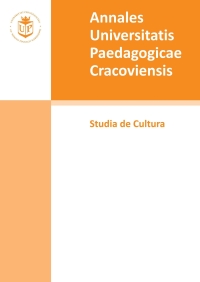Kompetencje audiowizualne dzieci postulowane przez przekaz a poziom i zakres jego rozumienia
Audiovisual competence of children postulated by the message and the level and scope of its understanding
Author(s): Agnieszka OgonowskaSubject(s): Educational Psychology, Neuropsychology
Published by: Wydawnictwo Uniwersytetu Komisji Edukacji Narodowej w Krakowie
Keywords: children; audiovisual competences; ideal viewers; real viewers; cognitive functions;
Summary/Abstract: Children in toddlers and pre-school ages create a powerful group of media consumers and related media products in Poland and around the world (eg gadgets, toys, food products). At the same time, the audiovisual broadcast offer addressed to them is often not adapted to their cognitive abilities and social competences, although it is advertised as performing educational functions. On the basis of public and hidden advertising, children’s guardians make decisions about the purchase of specific products and services, also guided by their proof of social equity and their own convenience. Television and screens of various technologies for more than 30 years, from year to year, with greater intensity accompany the development of the child, also in the form of miniaturized and mobile. The analysis of specific messages in terms of their form and content allows to determine what audiovisual competencies are included in the ideal recipient’s project, postulated by the message. On this basis, it can be further determined which cognitive functions its understanding and interpretation requires, and in what relation the figure of the ideal recipient remains in relation to the real viewer. Research of this kind has a specific practical meaning, because it allows to effectively fight with double disinformation: in relation to carers and their charges. The first group is convinced that children have contact with messages tailored to their age, others often have such experiences in contact with the media, which do not at all serve their optimal cognitive, social, emotional and even negative results. The article refers to the first stage of the study of the understanding of audiovisual communications by children at the indicated stage of development and refers to the analysis of existing literature and partial own research.
Journal: Studia de Cultura
- Issue Year: 11/2019
- Issue No: 1
- Page Range: 77-89
- Page Count: 13
- Language: Polish

